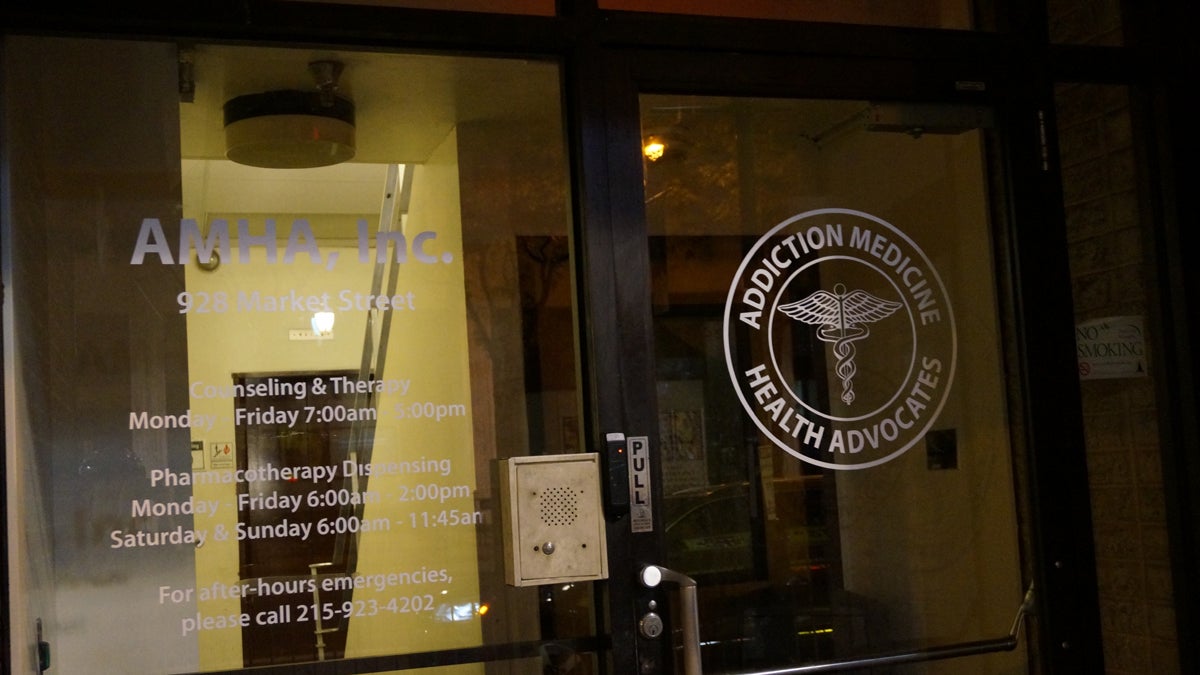For many methadone clinics, pope’s visit means closure or longer hours

For the first time in 30 years, the methadone clinic on Market Street will close because of travel restrictions while Pope Francis is in Philadelphia. (Jessie McDonald/WHYY)
In the past 30 years, the Addiction Medicine and Health Advocates treatment facility in Center City has never once had to shut its doors. Through snowstorms, SEPTA strikes, and worse, the clinic on Market Street has been open to give recovering addicts the daily dose of methadone that helps them keep clean.
With the visit of Pope Francis, though, that streak is about to end.
The clinic is one of three in the city that will be closed on Saturday and Sunday as the pontiff addresses crowds at Independence Mall and the Benjamin Franklin Parkway. Ten others will remain open, often with extended or special hours to pick up the slack from the shuttered facilities.
Executive director of the AMHA clinic Robert Holmes said 208 of his patients are set up go to other sites for treatment. The remaining 270 or so will take home enough of the liquid drug to last the weekend.
Those contingency plans are part of a citywide effort to ensure all 5,000-plus Philadelphia residents on methadone will continue to get it throughout the papal visit.
Tom Baier, the executive director for recovery services at JEVS Human Services, which runs two methadone clinics in the city, noted that addicts can go about a day without the drug before withdrawal symptoms begin.
“Of course, that’s our biggest fear, is that someone will relapse because they couldn’t get their methadone,” he said. “We don’t want them relapsing to street opiates, heroin, or Oxycontin or any of the other possibilities.”
Roland Lamb, director of Philadelphia’s office of addiction services, said for the first time the city will use a cloud-based encrypted system to share medical files and other information between clinics to coordinate care.
“We’ve been working on this now probably for four intense months, brainstorming different solutions, coming up with different possibilities and scenarios,” said Baier.
The idea for such a system was broached in February with the goal of being prepared for a natural disaster. But when word came that Pope Francis would be coming to Philadelphia, the event became a natural testing ground.
“When you consider the travel issues connected to this,” Lamb said of the pope’s visit, “this really represents a very different kind of disaster.”
Giving patients methadone outside of a clinic is somewhat unusual, and each facility wanting to provide more than one day’s worth to a client had to get special approval from both state and federal governments.
“Methadone is the most heavily regulated medical treatment in the history of mankind,” said Holmes.
Patients must be trusted to properly take and safely store the medicine, and not to divert the drug. Because of methadone’s prolonged effects, it sells on the street for five to six times more than heroin.
“When we’re granting someone take-home privileges,” said Baier, “we know we are putting a very powerful synthetic opiate medication in their hands. So we really have to be sure they know how to manage this.”
Lamb said only those meeting strict criteria will be allowed to self-medicate, and all clinics use only the liquid form of the drug, which is more difficult to overdose on and is likely to be diverted.
Across the city, about 750 addicts are scheduled to take advantage of an alternative clinic this weekend.
WHYY is your source for fact-based, in-depth journalism and information. As a nonprofit organization, we rely on financial support from readers like you. Please give today.

